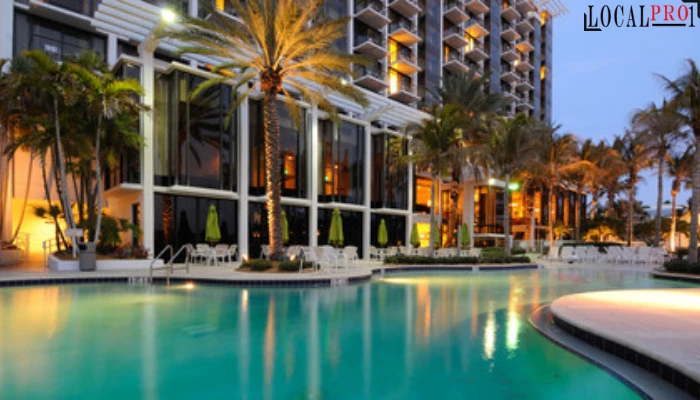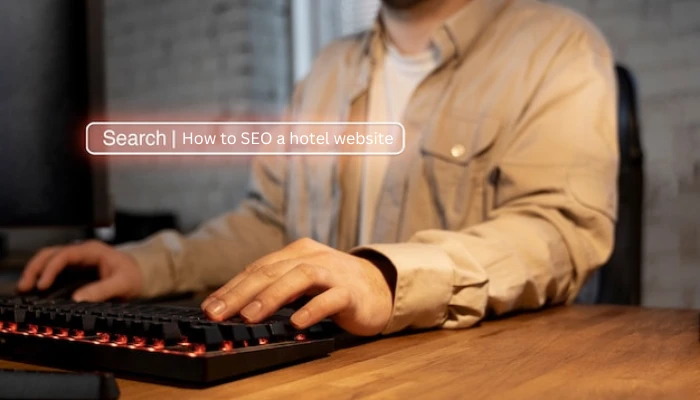Local SEO Services Near Me | Local Pro1 Welcome to...
Local Pro1 Unleashes the Power of SEO for Hotels| A Complete Guide
Local Pro1 Unleashes the Power of SEO for Hotels| A Complete Guide
In the highly competitive hospitality industry landscape, establishing a strong online presence is paramount for success. Search Engine Optimization (SEO) plays a crucial role in helping hotels enhance their visibility and reach a broader audience in the digital realm. This introduction will delve into the definition of SEO for hotels and underscore its importance in the contemporary hospitality landscape.

Definition of SEO for Hotels
SEO for hotels refers to the strategic process of optimizing a hotel’s online content, website structure, and digital presence to improve its visibility on search engines. In order to make sure that prospective visitors can quickly locate and interact with the hotel’s offers, the ultimate goal is to improve the hotel’s rating on search engine results pages (SERPs) for pertinent searches.
This optimization encompasses various elements, including keyword research, on-page and off-page optimization, mobile-friendliness, website speed, and quality content creation. By aligning a hotel’s online assets with search engine algorithms, SEO aims to improve its chances of being prominently featured when users search for accommodation, amenities, or related services.
Understanding SEO for Hotels
Keyword Research:
Identify relevant keywords: Research and choose keywords that potential guests might use when searching for hotels. Include location-specific terms, amenities, and other relevant descriptors.
Long-tail keywords: Optimize for longer, more specific phrases to capture niche audiences. For example, “pet-friendly hotels in [location]” or “luxury beachfront resorts.”
Competitor analysis: Analyze competitors’ keywords to discover new opportunities or gaps in your strategy.
On-Page Optimization:
Title tags and meta descriptions: Craft compelling and concise title tags and meta descriptions that incorporate target keywords and encourage clicks.
Quality content: Create informative, engaging, and unique content on your website. Include details about your hotel, services, amenities, and local attractions.
Header tags: Use header tags (H1, H2, etc.) to structure content and make it more readable for users and search engines.
Image optimization: Optimize images using descriptive file names and alt text, enhancing user experience and contributing to SEO.
Off-Page Optimization:
Backlinks: Build high-quality backlinks from reputable sources, such as travel blogs, local directories, and industry-related websites.
Social media presence: Maintain active profiles on social media platforms, sharing updates about your hotel, and promotions, and engaging with your audience.
Online reviews: Encourage satisfied guests to leave positive reviews on platforms like TripAdvisor or Google My Business, as they can positively impact your search rankings.
Unique Challenges for Hotel Websites:
Dynamic Inventory: Hotels often have a dynamic inventory with fluctuating prices, availability, and room types. Managing this in real-time on a website can be complex, requiring robust backend systems and efficient content management.
User Experience: Given the competitive nature of the industry, a seamless and visually appealing user experience is crucial. The challenge lies in balancing aesthetics with functionality to ensure potential guests can easily navigate the site, find information, and make bookings effortlessly.
Mobile Optimization: With the increasing use of mobile devices for travel planning, hotel websites must be optimized for various screen sizes and load quickly on mobile networks. This requires responsive design and a mobile-first approach.
Online Booking Security: Security concerns are paramount when it comes to online transactions. Ensuring a secure booking process is essential to build trust with users. This involves implementing secure payment gateways and complying with industry standards.
Search Engine Optimization (SEO): To stand out in the crowded online space, hotels need to optimize their websites for search engines. This involves using relevant keywords, creating high-quality content, and maintaining an active online presence.
User Intent in Hotel Search:
Personalization: Users have diverse intents when searching for hotels – from business trips to family vacations. Tailoring search results based on user preferences and past behaviors allows for a personalized experience, increasing the likelihood of conversion.
Effective Marketing: Knowing user intent enables hotels to create targeted marketing campaigns. For example, a user searching for a romantic getaway may respond well to promotions for honeymoon packages or SEO services.
Optimizing Website Content: By analyzing user intent, hotels can optimize their website content to better match what potential guests are looking for. This can include showcasing specific amenities, nearby attractions, or special offers that align with user preferences.
Enhancing User Experience: Recognizing user intent helps hotels streamline the booking process. Clear and relevant information, prominently displayed on the website, ensures that users quickly find what they’re looking for, resulting in a positive user experience.
How to SEO a Hotel Website

Keyword Optimization:
Identifying Target Keywords:
- Research relevant keywords related to your hotel, location, amenities, and services.
- Utilize tools like Google Keyword Planner, SEMrush, or Ahrefs to identify high-volume and low-competition keywords.
Incorporating Keywords in Content:
- Integrate target keywords naturally into website content, including page titles, headings, paragraphs, and meta descriptions.
- Ensure a good balance between keyword optimization and maintaining high-quality, engaging content.
On-Page SEO Techniques:
Title Tags and Meta Descriptions:
- Craft unique and compelling title tags for each page, including the hotel’s name, location, and relevant keywords.
- Write concise and appealing meta descriptions that encourage clicks and provide a brief overview of the page’s content.
URL Structure:
- Create clean, readable URLs that include relevant keywords and reflect the page’s content.
- Avoid using unnecessary parameters or symbols in URLs.
Header Tags:
- Use hierarchical header tags (H1, H2, H3, etc.) to structure content and signal the importance of different sections to search engines.
- Include relevant keywords in header tags to enhance SEO. Local Pro1 provides the best services related to SEO for Hotels.
Image Optimization:
- Optimize images by using descriptive file names and alt text containing relevant keywords.
- Compress images to ensure faster page loading times, improving user experience.
Off-Page SEO Strategies:
Link Building for Hotels:
- Acquire high-quality backlinks from authoritative websites, directories, and travel-related platforms.
- Develop partnerships with local businesses, tourism boards, and event organizers to secure relevant backlinks.
Social Media Signals:
- Maintain active and engaging social media profiles on platforms like Facebook, Instagram, Twitter, and Pinterest.
- Share visually appealing content, updates, and promotions to encourage user engagement and social signals.
Online Reviews and Reputation Management:
- Encourage guests to leave positive reviews on popular review sites like TripAdvisor, Google My Business, and Yelp.
- Respond promptly to both positive and negative reviews to show engagement and commitment to guest satisfaction.
Local SEO for Hotels
Importance of Local SEO:
Targeting Local Audience: Local SEO helps hotels reach potential guests in their immediate vicinity. As people often search for accommodation options, dining, and services near their location, optimizing for local searches ensures that your hotel is prominently displayed to those seeking local amenities.
Google My Business Optimization: Google My Business (GMB) is a powerful tool for local SEO. Optimizing your hotel’s GMB profile includes providing accurate information, and high-quality images, responding to reviews, and regularly updating your business hours. A well-optimized GMB profile enhances visibility in local search results.
Local Keyword Targeting:
Location-Specific Keywords: Identify and incorporate location-specific keywords in your website content, meta tags, and headings. This includes not only the city but also nearby attractions and landmarks. For example, if your hotel is in downtown New York, use keywords like “downtown New York hotel” or “near Times Square accommodation.”
Creating Localized Content: Develop content that reflects the local flavor of the area. This can include blog posts about local events, attractions, or guides to nearby points of interest. By creating content that resonates with the local community, you increase the relevance of your website in local search results.
NAP Consistency (Name, Address, Phone Number):
Ensuring Accurate Business Information: Maintain consistency in your hotel’s Name, Address, and Phone Number (NAP) across all online platforms. This includes your website, social media profiles, and local directories. Inaccurate information can confuse both users and search engines, impacting your local search rankings.
Local Citations: Acquire local citations by getting your hotel listed on reputable local directories, review sites, and industry-specific platforms. These citations not only provide valuable backlinks but also reinforce the credibility and authority of your business in local searches.
Why is SEO important for hotels?

Increased Visibility and Traffic: SEO helps hotel websites rank higher in search engine results pages (SERPs), making them more visible to potential guests. Improved visibility leads to increased organic traffic, as users are more likely to click on results appearing on the first page of search engines.
Enhanced User Experience: SEO involves optimizing the structure and content of a hotel website, leading to a better user experience. User-friendly websites are more likely to retain visitors, reducing bounce rates and increasing the likelihood of bookings.
Competitive Edge: In the highly competitive hospitality industry, SEO provides a way for hotels to stand out from the competition. Hotels that implement effective SEO strategies are more likely to attract potential guests and capture market share.
Targeted Audience Reach: SEO allows hotels to target specific keywords related to their offerings, attracting users actively searching for accommodation options. Targeted traffic is more likely to convert into bookings, leading to higher ROI for marketing efforts.
Local Search Optimization: Local SEO is particularly important for hotels, as travelers often search for accommodations based on location. Optimizing for local search helps hotels appear in relevant local queries, especially important for attracting guests in the vicinity.
Building Credibility and Trust: High search engine rankings are often associated with credibility and trustworthiness. Guests are more likely to trust and choose hotels that appear at the top of search results, considering them as reputable and reliable options.
Cost-Effective Marketing: Compared to traditional advertising methods, SEO is a cost-effective marketing strategy with a potentially higher return on investment. Organic traffic generated through SEO efforts can result in long-term benefits without the ongoing expenses associated with paid advertising.
Adapting to Changing Consumer Behavior: With the increasing reliance on online search for travel planning, hotel SEO needs to adapt to changing consumer behavior. SEO ensures that hotels remain visible and accessible to potential guests who use search engines to research and book accommodations.
Conclusion
Hotels must have a strong SEO (Search Engine Optimization) plan in place if they want to improve their online presence and increase organic traffic to their websites. By using relevant keywords, making material mobile-friendly, and optimizing it for search engines, hotels may raise their search engine rankings and attract more guests. Building an effective online presence can also be facilitated by concentrating on local SEO and producing interesting, high-quality content. Feel free to contact us for any types of query or services or related to SEO for Hotels.
FAQs
What Is SEO for Hotels And Why Is It Important?
SEO (Search Engine Optimization) for hotels involves optimizing a hotel’s online presence to improve its visibility on search engines like Google. It is crucial for attracting potential guests and increasing bookings.
How Can Seo Benefit My Hotel Business?
SEO can enhance your hotel’s online visibility, drive organic traffic, and increase the likelihood of direct bookings. It also helps in building a strong online reputation and staying competitive in the digital marketplace.
What Are The Key Elements Of Seo For Hotels?
Important elements include optimizing website content, utilizing relevant keywords, ensuring mobile-friendliness, improving website speed, obtaining high-quality backlinks, and managing online reviews.
How Can I Choose The Right Keywords For My Hotel’s Seo?
Conduct thorough keyword research based on your hotel’s location, amenities, and target audience. Utilize tools like Google Keyword Planner to identify relevant and high-search-volume keywords.
How Do I Optimize My Hotel’s Website Content For Seo?
Create high-quality, relevant, and engaging content. Include target keywords naturally in titles, headings, meta descriptions, and throughout the content. Ensure that the website structure is user-friendly and easy to navigate.
Our Services
Our Latest Posts
PPC White Label Services by Local Pro1 | Expert Solutions
PPC White Label Services by Local Pro1 | Expert Solutions...



